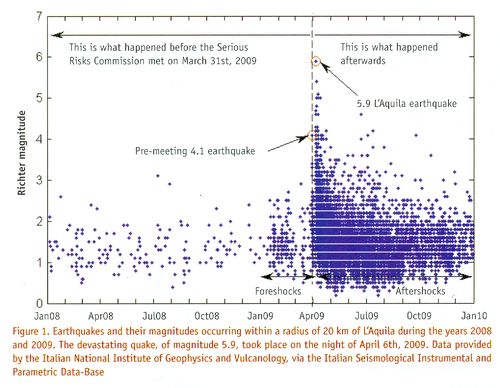Chance News 91: Difference between revisions
| Line 9: | Line 9: | ||
Prats discusses the April 2009 Italian earthquake during which about 300 residents lost their lives. Readers will recall news about the 13-month trial of the six scientists (and a government official), who were each sentenced to six years in prison for “providing ‘inaccurate, incomplete and contradictory information’ on the probability and risk of an earthquake and for falsely reassuring the population.” (See [http://test.causeweb.org/wiki/chance/index.php/Chance_News_89 “The perils of failed predictions”], Chance News 89, October-November 2012.)<br> | Prats discusses the April 2009 Italian earthquake during which about 300 residents lost their lives. Readers will recall news about the 13-month trial of the six scientists (and a government official), who were each sentenced to six years in prison for “providing ‘inaccurate, incomplete and contradictory information’ on the probability and risk of an earthquake and for falsely reassuring the population.” (See [http://test.causeweb.org/wiki/chance/index.php/Chance_News_89 “The perils of failed predictions”], Chance News 89, October-November 2012.)<br> | ||
Prats reports that, according to the [http://emidius.mi.ingv.it/DBMI11/ Italian Macroseismic Database], | Prats reports that, according to the [http://emidius.mi.ingv.it/DBMI11/ Italian Macroseismic Database], "L’Aquila has suffered earthquakes of magnitude 6 or higher on 13 occasions in the period 1315-2005, approximately every 50 years." Also, he reports that, according to a 1988 seismology paper[http://www.bssaonline.org/content/78/4/1538.full.pdf “Alarm systems based on a pair of short-term earthquake precursors”], "[T]he probability of a weak shock or swarm being followed by a major shock in the following 2-5 days is very low, of the order of 1-5%."<br> | ||
Also, he reports that, according to a 1988 seismology paper[http://www.bssaonline.org/content/78/4/1538.full.pdf “Alarm systems based on a pair of short-term earthquake precursors”], | |||
Prats believes that the most important information for the public would have been the “<i>risk</i>” (in the sense of expected loss) of an earthquake, and not the just its <i>likelihood</i>, because that risk assessment would have included both the probability of an earthquake and the expected loss in the event of an earthquake.<br> | Prats believes that the most important information for the public would have been the “<i>risk</i>” (in the sense of expected loss) of an earthquake, and not the just its <i>likelihood</i>, because that risk assessment would have included both the probability of an earthquake and the expected loss in the event of an earthquake.<br> | ||
Revision as of 15:41, 16 January 2013
Quotations
Forsooth
Aquila earthquake chart
“The L’Aquila earthquake: Science or risk on trial”
by Jordi Prats, Significance magazine, December 2012
Prats discusses the April 2009 Italian earthquake during which about 300 residents lost their lives. Readers will recall news about the 13-month trial of the six scientists (and a government official), who were each sentenced to six years in prison for “providing ‘inaccurate, incomplete and contradictory information’ on the probability and risk of an earthquake and for falsely reassuring the population.” (See “The perils of failed predictions”, Chance News 89, October-November 2012.)
Prats reports that, according to the Italian Macroseismic Database, "L’Aquila has suffered earthquakes of magnitude 6 or higher on 13 occasions in the period 1315-2005, approximately every 50 years." Also, he reports that, according to a 1988 seismology paper“Alarm systems based on a pair of short-term earthquake precursors”, "[T]he probability of a weak shock or swarm being followed by a major shock in the following 2-5 days is very low, of the order of 1-5%."
Prats believes that the most important information for the public would have been the “risk” (in the sense of expected loss) of an earthquake, and not the just its likelihood, because that risk assessment would have included both the probability of an earthquake and the expected loss in the event of an earthquake.
In any case, Significance Editor Julian Chamkin has given permission to post the following chart from the article (email of January 14, 2013):

Submitted by Margaret Cibes